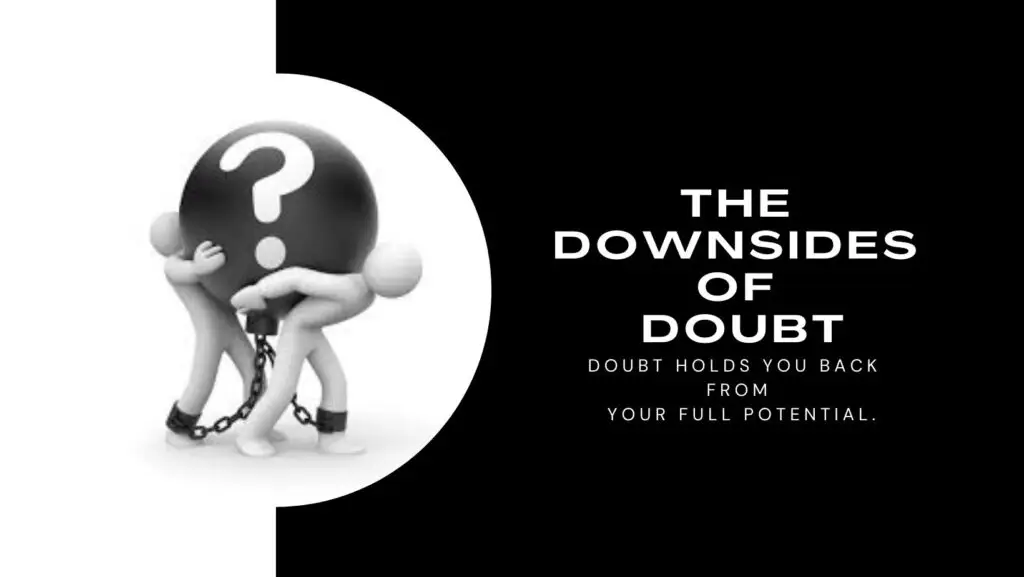By SAMWEL GITHINJI
Doubt can be a potent force, capable of influencing thoughts, emotions, and actions in significant ways. Its power lies in its ability to create uncertainty, hesitation, and fear, which can ultimately undermine one’s confidence, beliefs, and decisions.

Aspects of doubt in matters of faith and spirituality, can have profound effects on one’s relationship with God or higher power. It can create barriers to spiritual growth, hinder prayer and worship, and diminish a sense of connection or purpose in life. In addition, other aspects doubt where it can wreck a havoc are:
- Our Beliefs
- Emotional Influence
- Decision- making
- Interpersonsal relationship
- Physical manifestation
In the Bible, doubt is often portrayed as a lack of faith or trust in God. The most famous instance of doubt is perhaps found in the New Testament, where the disciple Thomas doubts the resurrection of Jesus until he sees and touches Jesus’ wounds (John 20:24-29). Jesus responds to Thomas by saying, “Because you have seen me, you have believed; blessed are those who have not seen and yet have believed. “In the Bible, Satan is often depicted as the mastermind who seeks to undermine people’s faith and trust in God. One of the ways he does this is by instilling doubt in believers’ minds. Let’s look at how he does it:
- Questioning God’s Word: In the Garden of Eden, Satan casts doubt on God’s commandment not to eat from the tree of the knowledge of good and evil. He asks Eve, “Did God really say, ‘You must not eat from any tree in the garden’?” (Genesis 3:1). By questioning God’s word, Satan plants seed of doubt in Eve’s mind about God’s trustworthiness. A believer may encounter doubt when faced with societal or cultural pressures that challenge the teachings of the Bible. For instance, in a secular environment where certain moral values are questioned, a believer may start to doubt the relevance or truthfulness of biblical principles.
- Challenging God’s Character: Satan often tries to distort believers’ understanding of God’s character by making them doubt His goodness, love, and faithfulness. For instance, in the story of Job, Satan accuses God of being unfair and challenges Job’s faith (Job 1:9-11; 2:4-5). As a believer you may experience doubt during times of suffering or hardship, wondering why a loving God would allow pain and adversity in their life. This doubt can be exacerbated by the influence of skeptics or by personal struggles with unanswered prayers.
- Undermining Confidence in Salvation: Satan may also use doubt to undermine believers’ confidence in their salvation. He may whisper lies about their worthiness or convince them that their sins are too great to be forgiven. A believer struggling with feelings of guilt and shame over past mistakes may begin to doubt whether they are truly saved or forgiven by God. This doubt can lead to feelings of despair and distance from God.
- Planting Seeds of Unbelief: Satan can gradually erode a believer’s faith by constantly feeding them doubts and fostering a spirit of unbelief. This can lead to a gradual drifting away from God and His truth. Over time, a believer who consistently entertains doubts about their faith may find themselves becoming increasingly skeptical and distant from God. This can happen through exposure to secular ideologies, negative experiences within the church, or personal struggles with unanswered questions.
- Creating Division and Discord: Satan seeks to disrupt unity among believers by sowing seeds of doubt, suspicion, and division. He may use gossip, jealousy, or misunderstandings to create rifts within the church community. A church congregation may experience doubt and division when disagreements arise over theological interpretations, worship styles, or leadership decisions. Satan can exploit these conflicts to weaken the church’s effectiveness and hinder its mission.
- Distorting Truth: Satan often twists the truth to create doubt and confusion. He may take Scripture out of context or present partial truths to deceive believers. In Matthew 4:1-11, Satan tempts Jesus in the wilderness by misquoting Scripture and distorting its meaning in an attempt to lead Him astray. A believer may encounter doubt when presented with false teachings or distorted interpretations of Scripture. For example, they may come across misleading information online or be influenced by charismatic leaders who twist biblical truths for their own gain.
In each of these examples, doubt becomes a tool for Satan to undermine faith and trust in God. In the book of James, doubt is contrasted with faith: “But when you ask, you must believe and not doubt, because the one who doubts is like a wave of the sea, blown and tossed by the wind. That person should not expect to receive anything from the Lord” (James 1:6-7). Throughout the Bible, doubt is often portrayed as something that can hinder spiritual growth and relationship with God. However, it’s also acknowledged as a natural human experience, and individuals who wrestle with doubt are not necessarily condemned but encouraged to seek understanding and strengthen their faith.
How do we overcome doubt? How do we root it out from our lives?






